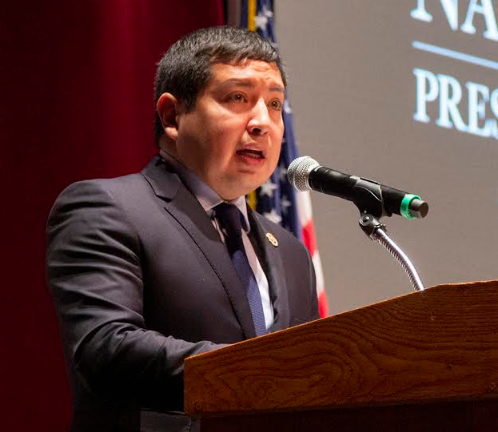
- Details
- By Native News Online Staff
BATON ROUGE, La. — Tribal Chairman David Sickey of the Coushatta Tribe of Louisiana was appointed to chair the state’s Murdered and Missing Indigenous Women and Girls (MMIWG) task force by Louisiana Gov. John Bel Edwards.
“I am honored and humbled by this appointment to chair the MMIWG Task Force and look forward to working alongside Governor Edwards and each of the appointed members to address the horrors of MMIWG,” Chairman Sickey said.
Want more Native News? Get the free daily newsletter today.
Gov. Edwards signed an Executive Order creating the task force on May 5, 2021, as well as a Proclamation establishing May 5th as MMIWG Day in the State of Louisiana.
The MMIWG task force will consist of 25 key state and local leaders, with representation from all of Louisiana's federally-recognized tribes and state recognized tribes.
Chairman Sickey and his staff have worked with the Governor’s Office to help launch the Louisiana’s MMIWG task force.
“The proclamation and executive order signed by Governor Edwards emphasize the urgent need for continued action to combat the tragedy of MMIWG. The MMIWG task force will proactively address the myriad causes of MMIWG and recommend solutions that can be implemented to protect Indigenous women and girls,” Chairman Sickey said.
The Coushatta Tribe of Louisiana has been at the forefront of the MMIWG issue nationally. In addition to the work on the state level with Gov. Edwards, the Coushatta Tribe is the executive producer of two powerful, critically acclaimed documentaries on the crisis: “Somebody’s Daughter” and “Say Her Name.”
Louisiana is home to four federally recognized Indian tribes and eleven state recognized tribes.
More Stories Like This
Native News Weekly (August 25, 2024): D.C. BriefsUS Presidents in Their Own Words Concerning American Indians
Ethics Complaint Alleges Former Navajo Nation Chief of Staff Accepted Gifts From Contractor
Monday Morning (December 14, 2025): Articles You May Have Missed This Past Weekend
Senators Demand Accountability Amid Reports of ICE Questioning Native Americans
Help us defend tribal sovereignty.
At Native News Online, our mission is rooted in telling the stories that strengthen sovereignty and uplift Indigenous voices — not just at year’s end, but every single day.
Because of your generosity last year, we were able to keep our reporters on the ground in tribal communities, at national gatherings and in the halls of Congress — covering the issues that matter most to Indian Country: sovereignty, culture, education, health and economic opportunity.
That support sustained us through a tough year in 2025. Now, as we look to the year ahead, we need your help right now to ensure warrior journalism remains strong — reporting that defends tribal sovereignty, amplifies Native truth, and holds power accountable.
 The stakes couldn't be higher. Your support keeps Native voices heard, Native stories told and Native sovereignty defended.
The stakes couldn't be higher. Your support keeps Native voices heard, Native stories told and Native sovereignty defended.
Stand with Warrior Journalism today.
Levi Rickert (Potawatomi), Editor & Publisher

